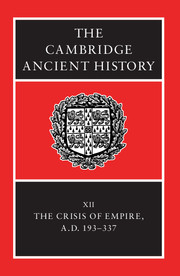Book contents
- Frontmatter
- PART I NARRATIVE
- 1 The Severan dynasty
- 2 Maximinus to Diocletian and the ‘crisis’
- 3 Diocletian and the first tetrarchy, a.d. 284–305
- 4 The Reign of Constantine, a.d. 306–337
- PART II GOVERNMENT AND ADMINISTRATION
- PART III THE PROVINCES
- PART IV THE ECONOMY OF THE EMPIRE
- PART V THE NON-ROMAN WORLD
- PART VI RELIGION, CULTURE AND SOCIETY
- Chronology
- Bibliography
- Index
- Topographical map of the Roman empire
- Map 2 The Roman empire in a.d. 211
- The Roman empire in a.d. 314
- The Rhine–Danube limes in the late second century
- References
3 - Diocletian and the first tetrarchy, a.d. 284–305
from PART I - NARRATIVE
Published online by Cambridge University Press: 28 March 2008
- Frontmatter
- PART I NARRATIVE
- 1 The Severan dynasty
- 2 Maximinus to Diocletian and the ‘crisis’
- 3 Diocletian and the first tetrarchy, a.d. 284–305
- 4 The Reign of Constantine, a.d. 306–337
- PART II GOVERNMENT AND ADMINISTRATION
- PART III THE PROVINCES
- PART IV THE ECONOMY OF THE EMPIRE
- PART V THE NON-ROMAN WORLD
- PART VI RELIGION, CULTURE AND SOCIETY
- Chronology
- Bibliography
- Index
- Topographical map of the Roman empire
- Map 2 The Roman empire in a.d. 211
- The Roman empire in a.d. 314
- The Rhine–Danube limes in the late second century
- References
Summary
Capitoline Zeus took pity at last on the human race and gave the lordship of all the earth and the sea to godlike king Diocletian. He extinguished the memory of former griefs for any still suffering in grim bonds in a lightless place. Now a father sees his child, a wife her husband, a brother his brother released, as if coming into the light of the sun a second time from Hades. Gladly Diogenes, saver of cities, received the favour of the good king and swiftly dispatched to the cities the joyful forgetfulness of griefs. The whole land takes delight in its joy as at the light of a golden age, and the iron, drawn back from the slaughter of men, lies bloodlessly in the scabbard. You too have rejoiced to announce the royal gift to all, governor of the Seven Nomes and the Nile has praised your mildness earlier still, when you governed the towns on Nilotic Thebes with care and righteousness.
These translated hexameter verses were perhaps composed for recital at the fourth celebration of the Capitoline games at the town of Oxyrhynchus in middle Egypt which would have fallen in the summer or autumn of a.d. 285, a few months after the accession of the emperor Diocletian. Poems and other pronouncements heralding the arrival of a golden age, either contemporaneously or in retrospect, are neither unique nor particularly surprising. It is perhaps more unusual that the accession of Diocletian has been more or less universally hailed by posterity as one of the most significant watersheds in the history of the Roman empire, marking the transition from the ‘military anarchy’ of a.d. 235–84 to the ‘dominate’ of the later empire.
Information
- Type
- Chapter
- Information
- The Cambridge Ancient History , pp. 67 - 89Publisher: Cambridge University PressPrint publication year: 2005
References
Accessibility standard: Unknown
Why this information is here
This section outlines the accessibility features of this content - including support for screen readers, full keyboard navigation and high-contrast display options. This may not be relevant for you.Accessibility Information
- 13
- Cited by
